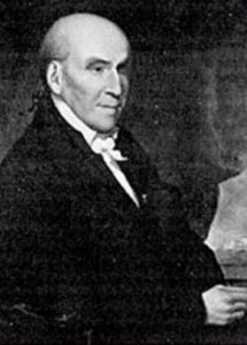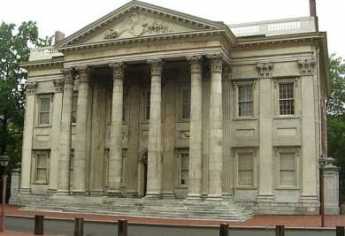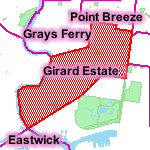Related Topics
Whither, Federal Reserve? (1) Before Our Crash
The Federal Reserve seems to be a big black box, containing magic. In fact, its high-wire acrobatics must not be allowed to fail. Nevertheless, it may be time to consider revising or replacing it.
Philadelphia Economics
economics
French Philadelphia
French Philadelphia
Stephen Girard, Compulsive Gambler

|
| Stephen Girard |
Keep flipping a coin, it's unlikely to come up Heads eighteen times in a row, but it could happen. Once they get to be the richest in the country, most people would quit flipping rather than risk everything on the fifty-fifty chance the next flip will come up Tails. But Robert Morris, William Bingham, Alexander Hamilton, and many others would not only reach the pinnacles of wealth but still gamble everything they owned on a bold chance to get lots more. Stephen Girard was the same way, although in his case he never seemed to lose.

|
| First Bank |
By 1811, Girard was the wealthiest man in America. Among other things, he was the largest stockholder of the First Bank, and ran the largest shipping and merchantile empire in Philadelphia, trading extensively with France and England. From these contacts, he was able to see relationships between France and England, and between England and America, we're going to deteriorate into war. So, Girard cashed out, totally selling his overseas trading interests rather than risk blockades and confiscations. It was a shrewd move, boldly getting out before others could see what he saw. Girard was 61, his wife was permanently hospitalized, and he certainly never had to work again.
As a major stockholder in the bank, Steven Girard was well aware of the strong populist sentiment that the Government had no business running a bank. Although he did his best to preserve the bank, he could see its closure was politically inevitable with Thomas Jefferson as President of the United States, soon to be followed by his Virginia crony, James Madison. When the charter was revoked, Girard took his immense cash horde -- and bought the doomed bank with it. From the Virginians' perspective, they were going to need that money if they went to war with England; while in Girard's view they could not possibly fight a war without a bank to finance it. As matters turned out, the War of 1812 was largely financed by Girard's personal wealth, which ultimately meant that Girard bought the Government's bank with the Government's own money.

|
| Girard Estate Map |
Even making allowances for the fact that the troubles over the national banks were a symptom of the immature financial markets of the nation, which made passive investment difficult for those with rentier ambitions, Girard was clearly a compulsive gambler. Most compulsive gamblers are losers, Girard just happened to be a compulsive winner. His new bank was enormously successful, and as late as 1829 he purchased all of Schuylkill County for its coal discoveries, expressly directing in his will that his heirs were never to sell it. His estate still owns a large part of South Philadelphia, based on the same long foresight of a pretty old man. If you think that's easy to do, just ponder what finally happened to Robert Morris, Haym Salomon, and Alexander Hamilton.
Originally published: Wednesday, October 31, 2007; most-recently modified: Wednesday, June 05, 2019